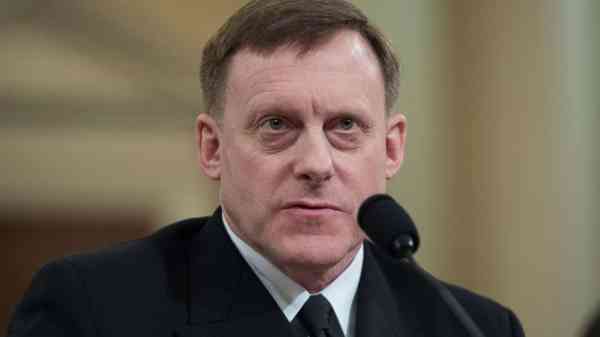
Tuesday evening, Retired Adm. Michael Rogers, who left the NSA in May after leading the agency for four years, specifically referred to a letter that more than a dozen former senior officials signed last month expressing their dismay at Trump’s decision to revoke the security clearance of former CIA director John Brennan.
Rogers said that, while he agreed with the “fundamental premise” that it’s the right of every American citizen to express their views, two things about the letter “gave [him] pause.”
First, he said, he didn’t believe it would be effective as a protest. Second, and worse, he said, it would make the work of still-serving American intelligence professionals that much harder.
Rogers, who has kept a low profile since the end of his government service, said that intelligence is the most effective when the customer – in this case the president — understands they’re getting an honest assessment that is not tinged with politics.
“We must ensure that nothing we do calls in question the objective nature of intelligence,” he said.
Trump has previously criticized U.S. intelligence and other bureaucratic institutions, suggesting there’s a “deep state” of career officials who are trying to undermine his agenda. Rogers said that sometimes he wanted to tell his former colleagues who appear on television to rebuke the president, “Guys, this is not helping.”
“Pouring gasoline on the fire is not going to reduce the flame,” he said.
Rogers made the comments as he sat between former Director of National Intelligence James Clapper on his right and former CIA analyst Phil Mudd and former NSA and CIA Director Michael Hayden on his left — each of whom signed letters of protest. The former high-level officials met Tuesday to discuss the concept of dissent among intelligence professionals at a panel put on by Hayden’s Center for Intelligence, Policy and International Security at George Mason University. Mudd signed another open letter that carried the names of dozens of other ex-intelligence officials.
In mid-August, the White House announced that Brennan’s security clearance had been revoked because he “recently leveraged his status with access to highly sensitive information to make a series of unfounded and outrageous allegations, wild outbursts on the internet and television about this administration.”
Brennan had described Trump’s performance at the Helsinki summit with Russian leader Vladimir Putin as “treasonous,” and has been a sharp, vocal critic of the president. Upon learning the news, Brennan said on Twitter the move was “part of a broader effort by Mr. Trump to suppress freedom of speech & punish critics” — a sentiment with which many former intelligence officers agreed.
“As former senior intelligence officials, we feel compelled to respond in the wake of the ill-considered and unprecedented remarks and actions by the White House regarding the removal of John Brennan’s security clearances,” wrote the senior ex-officials, who served under both Republican and Democratic administrations, in their letter. “We all agree that the president’s action regarding John Brennan and the threats of similar action against other former officials has nothing to do with who should and should not hold security clearances – and everything to do with an attempt to stifle free speech.”
Rogers said he was approached to sign the letter, but declined.
Hayden, who led the NSA from 1999 to 2005 and then the CIA from 2006 to 2009, respectfully disagreed with Rogers at the panel, saying that amid the security clearance debate “there was, in our view, a higher principle involved that we would be denied something” for political purposes to which the former senior intelligence officers would otherwise be entitled.
Also at Tuesday’s event, Rogers described his disagreements with Trump when it came to intelligence assessments of hostile Russian activity. According to Rogers, after hearing the assessments, the president would “often” say, “Mike, you know I’m in a different place.” Rogers said he would tell the president he understood, but it was his job to tell him what his agency assessed to be happening.
Rogers disputed a news report that Trump once asked him to publicly say there was no evidence of collusion with Russia during the 2016 presidential campaign. Rogers told the audience he was never asked to do that and said he never discussed collusion with the president. He said he had “no clue” what special counsel Robert Mueller might find in his investigation.
During congressional testimony in February, Rogers made headlines when he said the U.S. had not done enough to deter Russian aggression online and that he didn’t have “additional authorities” to better enable his agency to fight back. Tuesday Rogers said that by the time he left the NSA, things had improved.
“I was glad to see the broad direction [in which] we were moving,” he said.
Sourse: abcnews.go.com
0.00 (0%) 0 votes


































